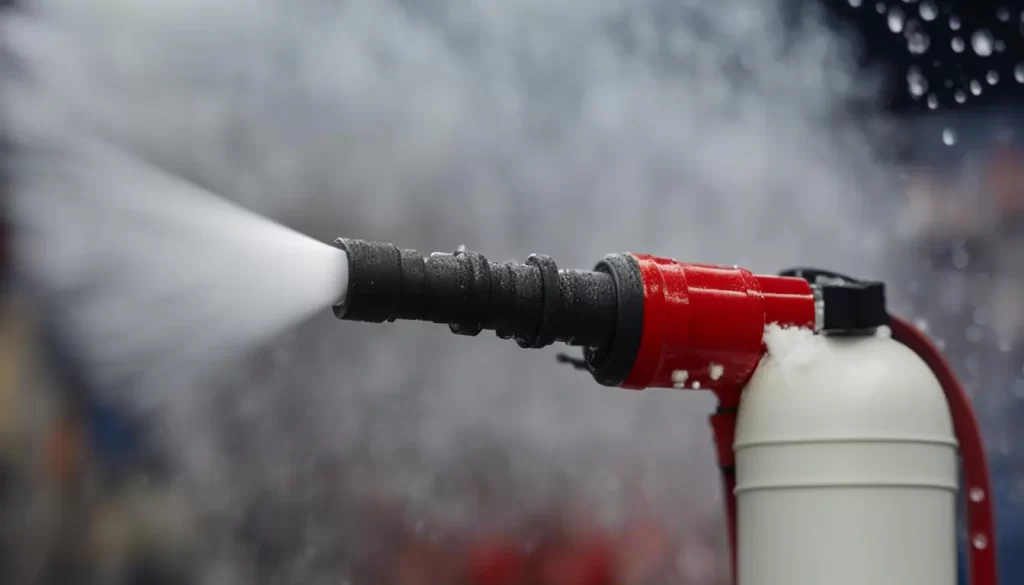why must fire extinguishers be routinely maintained?

Your Fire Safety Partner: Why Routine Fire Extinguisher Maintenance is Crucial
Fire extinguishers are the first line of defense in case of a fire emergency. But just like any essential tool, they need proper care to function flawlessly when you need them most. Here’s why routine fire extinguisher maintenance is a non-negotiable aspect of fire safety:
Ensuring Readiness:
Imagine reaching for a fire extinguisher in a critical moment, only to find it malfunctioning. Regular maintenance ensures your extinguisher is charged and operational, ready to tackle a fire effectively. Think of it as a safety check for your fire protection equipment.
Detecting Hidden Issues:
Fire extinguishers are complex mechanisms with pressurized components. Routine maintenance allows trained technicians to identify potential problems like leaks, corrosion, or gauge malfunctions before they escalate. Early detection prevents costly repairs and ensures your extinguisher remains reliable.
Preventing Tampering:
Regular inspections ensure the extinguisher remains untampered with and in its designated location. A missing tamper seal or a dislodged pin could indicate someone has interfered with the extinguisher, potentially compromising its functionality.
Meeting Safety Regulations:
Most workplaces and buildings have legal requirements for fire extinguisher maintenance. Regular inspections by a qualified technician ensure your extinguishers comply with local fire safety codes and regulations.
Peace of Mind in an Emergency:
Knowing your fire extinguishers are properly maintained provides invaluable peace of mind in case of a fire. You can focus on extinguishing the flames or evacuating the area with confidence, knowing you have a reliable tool at your disposal.
Beyond Basic Maintenance:
Routine maintenance goes beyond simply checking the pressure gauge. Qualified technicians perform a thorough inspection, including:
- Internal examination: Verifying the extinguisher’s internal components are free of damage or corrosion.
- Weighing the extinguisher: Ensuring it has the proper amount of fire-fighting agent.
- Cleaning and lubrication: Maintaining the smooth operation of the extinguisher’s mechanisms.
- Operating instructions review: Confirming you and others understand how to use the extinguisher properly.
Investing in Safety:
Regular fire extinguisher maintenance is a wise investment in your safety and the safety of your loved ones or colleagues. Think of it as preventive maintenance for your fire protection system, similar to how you maintain your car or other essential equipment.
Taking Action:
- Schedule regular inspections: Consult with a qualified fire extinguisher maintenance company to establish a maintenance schedule for your fire extinguishers.
- Familiarize yourself with your extinguishers: Learn how to operate the different types of extinguishers you have on hand.
- Practice fire safety: Develop an evacuation plan and practice fire drills to ensure everyone knows how to respond in an emergency.
By prioritizing fire extinguisher maintenance and fire safety education, you can create a safer environment for yourself and those around you. Remember, a well-maintained fire extinguisher can be the difference between containing a small fire and experiencing a devastating event.
Beyond the Basics: Fire Extinguisher Maintenance FAQs
Understanding the importance of fire extinguisher maintenance is crucial, but you might have some lingering questions. Here are some frequently asked questions (FAQs) addressed:
- How often should fire extinguishers be maintained?
The frequency of maintenance depends on the type of extinguisher and local regulations. Generally, most extinguishers require annual inspections, with some needing additional servicing every six months. It’s best to consult your fire extinguisher service company for specific recommendations.
- What happens if I don’t maintain my fire extinguisher?
A neglected extinguisher becomes unreliable and potentially dangerous. It might not discharge properly, leak chemicals, or even explode due to internal pressure buildup. This not only compromises fire safety but can also lead to injuries.
- Can I maintain my fire extinguisher myself?
While some basic visual checks can be done (ensuring tamper seal is intact, pressure gauge is in the green zone), it’s highly recommended to have a qualified technician perform a thorough inspection. They have the expertise and tools to identify potential issues and ensure proper functionality.
- What if my fire extinguisher needs repairs?
A qualified technician can diagnose the problem and perform any necessary repairs. Don’t attempt to fix a malfunctioning extinguisher yourself – it can be dangerous and compromise the extinguisher’s effectiveness.
- How can I find a qualified fire extinguisher maintenance company?
Look for companies certified by a reputable organization like the National Fire Protection Association (NFPA). Ask for references and ensure they are familiar with the specific types of extinguishers you own.
The Takeaway: A Proactive Approach to Fire Safety
Fire extinguisher maintenance is a proactive approach to fire safety. By prioritizing regular inspections and proper care, you ensure these crucial tools are ready to perform when needed. Remember, a well-maintained fire extinguisher can buy you precious time to extinguish a small fire or evacuate safely in an emergency.
Beyond Extinguishers: Building a Comprehensive Fire Safety Strategy
While fire extinguishers are a vital first line of defense, a comprehensive fire safety strategy goes beyond just these tools. Here are some additional steps you can take to create a safer environment:
-
Fire Alarms and Smoke Detectors: Ensure you have functioning fire alarms and smoke detectors installed in your home or workplace. Test them regularly and replace batteries according to manufacturer recommendations.
-
Fire Escape Plan: Develop a fire escape plan for your home or workplace. This plan should include designated escape routes, meeting points outside the building, and procedures for assisting those who may need help evacuating.
-
Fire Drills: Practice your fire escape plan regularly with everyone in your household or workplace. This familiarity can be crucial during a real fire emergency.
-
Flammable Material Management: Store flammable liquids and materials properly in designated containers away from heat sources. Dispose of them responsibly according to local regulations.
-
Cooking Safety: Never leave cooking unattended and ensure you have a working fire extinguisher readily available in your kitchen.
-
Electrical Safety: Avoid overloading electrical outlets and have faulty wiring repaired by a qualified electrician.
By combining routine fire extinguisher maintenance with these fire safety practices, you can significantly reduce the risk of fire and ensure everyone knows how to respond effectively in case of an emergency.



